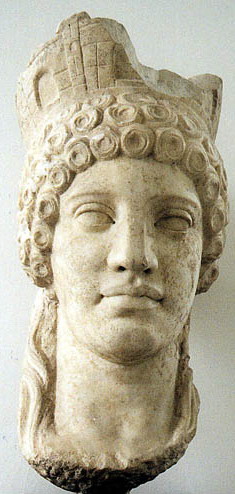return to Home Page
or move on to Goddess Papa, next chronologically,
or use Her Cyclopedia Index
Pandora, All-Giving.
P*ND4R1
Alternate meanings: Rich-in-Gifts, All-Gifted.
[to Whom the twenty-third day of June, day 174, is dedicated]

Geography/Culture: Greek
Description: Goddess of earth; Endless producer of food for animals and humanity; She Who pours out blessings from Her pithos; Bounteous nature.
Later, (in the familiar antifeminist fable), She was said to be the First Woman, made from Earth by Hephaestus; She Whose qualities were gifts from the Olympians; She Who was sent by the Olympians to Prometheus as a punishment, or in revenge, for his theft of fire.
To Whom Sacred: cornucopia; Pandora's box (the story of the spites which leapt out of it may have originally been a warning to men who pry into women's secrets -- or it is said, the box was originally a pithos which contained winged souls).
Male Associates: consort, Epimetheus, ----, brother of Prometheus, ----.
Titles/Variants, etc:
- Also called: Anesidora, Sender-Forth-of-Gifts.
- She is associated with Elpis, Help, Who is linked with Spes.
- Title of Hera, our-Lady.
- Some say Mother, some say Daughter, of Pyrrha, below. {although I may have confused this -- it may only be applicable to Rhea}.
- Her more original name was Rhea, below.
Source: Graves GMv1 149.
Pyrrha, Fiery-Red.
PÜRHr1,
Alternate meaning: Red-One.
Geography/Culture: Greek.
Linguistic Note: from Greek pyrrha, 'fiery red', and it is an adjective applied to wine.
Description: Mother Goddess of the Puresati (Philistines), originally a Cretan people; She Who with Her consort repeopled the world with 'the bones of their Mother' after the flood.
To Whom Sacred: the pyrrhic dance.
Male Associates: consort, Deucalion, Sweet-Wine. Sons, Orestheus, ----, and Amphictyon, ----.
Titles/Variants, etc:
- See also Amphictyonis, President-of-Neighbours.
- A Greek name for Ishtar, Light-Giving, in the story of the Deucalion flood.
- Mother, or creatrix of: Cybele, She-with-the-Axe, {presumably a Greek invention}.
- Some say Daughter, some say Mother, of Pandora, All-Giving. {But I may have confused this, FW}.
- Alternate name for Rhea, Earth, below.
Source: Graves GMv1 139, 141-2; Graves WG 226; IGEL 713; Kravitz WWGRM 176.
Rhea, Earth.
HrE1
Alternate meanings: {Milk}, Motherly.
Geography/Culture: Crete > Greece. Crete was the original seat of Her worship where, perhaps, people of Asiatic origin formed part of the primitive population and who brought with them worship of the Asiatic Great Mother Cybele who subsequently became known as Rhea.
Linguistic Note: Greek orthography Rho-epsilon-alpha (Rhea). Perhaps from, or related to rheo (rho-epsilon-omega), 'to flow, run, stream, gush'. See also Renenet Linguistic Note: Graves says Greek rhea means 'milk', but doesn't give the Greek orthography.
Description: Mother of the Deities; Goddess of earth and all living things; Some say Goddess of the sky; Most Holy Queen; She Who gives birth to all the creatures of Her surface; Great, fruitful, kindly, Earth Herself; Titanis; {Evolver of the opposable thumb}.
See also Goddess Anthology under Rhea.
Male Associates: son, Zeus, ----, by consort Cronos, ----, whose attendants are the Dactyls, associated with smith-craft. Her Divine attendants and their mortal incarnations as Her priests are the Curetes.
To Whom Sacred: snake; {thumb}; fingers (the Dactyls); smithcraft; double-axe; torch; brass-drum; stone (substituted for Her son Zeus and swallowed in his stead by Her consort); the Pyrrhic dance; the Milky Way Galaxy (formed when Her milk spurted forth at the birth of Zeus).
Titles/Variants, etc:
- As Rhea-Cybele She bore the title Adrasteia, Inescapable-One, Who is linked with Nemesis.
- She is related to Athene, {I-Have-Come-From-Myself}.
- She was identified with Cotytto, {Cup-of-Life}, Who is linked with Bendis.
- She was identified with Cybele, She-With-the-Axe, Whose name became Her surname: Rhea-Cybele.
- Some say Mother of Dione, Queen-of-the-Bright-Sky.
- Some have said that Eurynome, Wide-Wandering, is identical with Cretan Rhea.
- Mother of Demeter, Barley-Mother.
- Daughter of Gaia, Earth.
- Mother of Hera, Our-Lady.
- Mother of Hestia, She-of-the-Hearth, Who is linked with Vesta.
- From Her identification with Cybele She has the title: Idaia, She-of-Mount-Ida, Who is linked with Ida.
- She was identified with Egyptian Nut, Night-Sky, in Her sky Goddess aspect.
- The Romans identified Rhea with Ops, Fruitfulness.
- Also called Pandora, All-Giving, above..
- Philyra, Lime-Tree, may be aspect of Rhea, or perhaps a title.
- Phyllis, Leafy, Who laid curses in the name of Rhea, may be a form of Rhea.
- Also called Pyrrha, Red-One, above. {check Graves GMv2 352}.
- Perhaps She lingers on in Roman Rhea-Silvia, below.
- Variant: Rheia.
Source: Graves GMv2 352; ibid WG 85. {check also Graves WG 120, 163, 170, 179 (some missing see index), 319, 335, 385, 403}.
Rhea-Silvia, Milk-Wood.
HrE1-SYLVY1
Geography/Culture: Roman.
Linguistic Note: For Rhea see Rhea Linguistic Note. Silvia derives from Latin silva, 'wood'. So Her name means: Earthy-Wood? Milk-Wood? Motherly-Wood?
Description: Goddess of Nature; Ancestress of the Roman people.
Male Associates: sons, Romulous, ----, and Remus, ---- by consort: Mars, ----.
Titles/Variants, etc:
- See also Lupa, She-wolf.
- Variant: Rea.
worked on: June 1990; August 1991; May, June 1995
Return to the top of this document.
